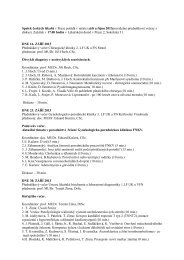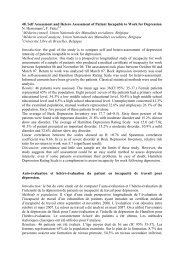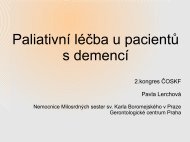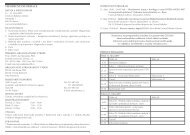ABSTRACTS â ORAL PRESENTATIONS - AMCA, spol. s r.o.
ABSTRACTS â ORAL PRESENTATIONS - AMCA, spol. s r.o.
ABSTRACTS â ORAL PRESENTATIONS - AMCA, spol. s r.o.
You also want an ePaper? Increase the reach of your titles
YUMPU automatically turns print PDFs into web optimized ePapers that Google loves.
cells (SFC) using IFN-γ Elispot in comparison to controls. Moreover, a trend to higher<br />
numbers of SFC was observed in these patients when compared to persons with a low<br />
frequency of recurrences (n=7). Additionally, lack of difference was found in CD38 and<br />
HLA-DR expression on circulating CD8+ T cells between the study groups.<br />
Overall, these results indicate that systemic HSV-specific T cells are not suppressed<br />
during recurrent genital herpes and the increased frequencies of these cells in the blood<br />
are associated with the disease severity rather than with a protective role of these cells.<br />
Acknowledgements<br />
This work was supported by the grant of Charles University in Prague, PRVOUK/P24/LF1/3.<br />
References<br />
Wald A, Zeh J, Selke S, et al. Reactivation of genital herpes simplex virus type 2 infection<br />
in asymptomatic seropositive persons. N Engl J Med 2000;342:844-50.<br />
Zhu J, Koelle DM, Cao J, et al. Virus-specific CD8+ T cells accumulate near sensory nerve<br />
endings in genital skin during subclinical HSV-2 reactivation. J Exp Med 2007;204:595-603.<br />
P56. REDUCED ALLERGY INCIDENCE AND INCREASED ACTIVITY OF TREGS IN SIX YEAR<br />
OLD CHILDREN OF ALLERGIC MOTHERS COLONIZED AT BIRTH BY PROBIOTIC E. COLI<br />
Jiří Hrdý 1 , Ingrid Kocourková 2 , Rája Lodinová-Žádníková 2 , Ludmila Prokešová 1<br />
1<br />
Institute of Immunology and Microbiology, First Faculty of Medicine, Charles University<br />
in Prague, Prague, Czech Republic; jiri.hrdy@lf1.cuni.cz<br />
2<br />
Institute for the Care of Mother and Child, Prague, Czech Republic<br />
Allergy belongs to one of the most common diseases with still increasing incidence.<br />
In our previous work, we reported decreased allergy incidence in probiotic (Colinfant<br />
New Born, Escherichia coli O83:K24:H31) colonized children [Lodinová-Žádníková, 2003,<br />
Lodinová-Žádníková, 2010].<br />
In this work, significantly decreased allergy incidence in colonized children of allergic<br />
mothers (children with high risk for allergy development) in comparison to noncolonized<br />
children of allergic mothers was observed. Allergy incidence in colonized<br />
children of allergic mothers was comparable with allergy incidence in non-colonized<br />
children of healthy mothers (children with relatively low risk for allergy development).<br />
The beneficial effect of probiotics is well acknowledged but the mechanisms of their<br />
actions are still unclear.<br />
Because regulatory T cells (Tregs) are known to set the tolerance to relatively innocuous<br />
environmental antigens (allergens), the proportion and functional properties of Tregs<br />
from peripheral blood of colonized and non-colonized children in relation to their allergy<br />
status were followed by flow cytometry. Surface markers of Tregs, intracellular FoxP3<br />
and regulatory cytokines IL-10 and TGF-beta were tested.<br />
The Treg percentage was lower in the blood of healthy children but the MFI (median of<br />
fluorescence intensity) of FoxP3 reflecting better the functional potency was higher in<br />
Tregs of healthy children in comparison with allergic ones. Furthermore, intracellular<br />
presence of IL-10 was detected in higher percentage of Tregs of healthy children in<br />
154 Analytical Cytometry VII








